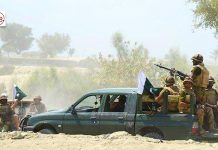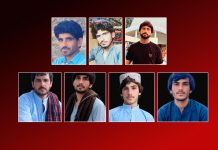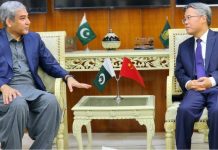Author: Sarmatab Baloch
Martyrdom is an eminence of prodigious act of inking the historical pages by a group of people of a nation with marks of glory, victory and never-bowing-down attitude against the alien supremacies. By and large, despite the bitter-hard fact that the loss of a revolutionary is an esteemed harm to a national movement or survival, but is also a matter of rejoice for such a nation. Since adopting the philosophy of martyrdom means you did not bow down before the enemy forces – hence you deserve and own congratulations and cheers.
Typically, when a movement is running anywhere in the world, its primary demand from its people is sacrifices. That sacrifice can refer to wishes, families and friends, and, above all, of one’s life. Such a sacrifice homes the theory of martyrdom – the highest degree of sacrifice. Other movements in books and movies, we are eye-witnesses of the ongoing Baloch liberation movement where Baloch have lost, or we better say sacrificed, numerous leading heads. Whether it is Balach Marri, Chairman Ghulam Mohammad Baloch, Shari Baloch, Dr. Mannan Baloch, Banuk Karima Baloch, Ehsan Baloch, Raza Jahangeer Baloch, Lala Munir Baloch, Sajid Hussain Baloch, Ilyas Nizar Baloch, Peerak Baloch, Salman Hammal, Bali Baloch, Rasool Jan Baloch, Hasil Qazi Baloch or thousands of other Baloch freedom fighters (either performing duties on mountains or mobilising the students and masses on ground), Baloch have never showed back to sacrifices for the preservation of their land, people, culture, heritage and all the other belongings.
In a general sense, we have two genera of martyrs in the Baloch movement – which is likely the case with any other movement as well. One, those upon whose martyrdom, their organisation comes forward and endorses their martyrdom. Such revolutionaries are usually martyred in clashes, operations, face-to-face war, self-sacrifices or they include those who are well-known before the nation as was Banuk Karima, Ustad Aslam, Balach Marri, Qambar Chakar, Chairman Ghulam Mohammad and many others who were leading the movement from the front – whether on mountains or among the people. The later is, upon whose martyrdom, neither party comes forth to publicly acknowledge them as their member, nor their families think of doing anything as such. The reasons for an organisation maybe that of institutional policies or circumstantial compulsions, while family members do so for getting away with Pakistani military’s and intelligence wings’ continuous and unethical harassments.
The revolutionaries in the later format struggle in silence and get martyred in silence. No one knows who they were neither does anyone apprehends their tasks during the movement other than the relevant co-revolutionaries. And most of all, they never grieve nor complain for any highlight, for any riches, for any fame and for anything else, but act upon the theory of sacrifice for the attainment of the end goal which is independence. There is no difference between the two types of revolutionaries or martyrs other than their method of struggle defined by their respective organisations for the sole cause of national liberation.
We, as a nation, usually pay tributes to the recorded martyrs in either way, but rarely remember the unsung or unknown heroes who got lost under the strong wave of silent struggle. They knew that their martyrdom would not be treated as ‘martyrdom’ by the nation, neither would their civilians remember them or count them as martyrs for their role was always under the ground, but they smiled and struggled for their liberation on and on.
Have you ever imagined of an ‘unknown martyrdom’? Or rather of martyrdom itself? Imagine you are part of the Baloch liberation movement and working underground. No one is supposed to know who you are in the organisation and what your role is. You are to act on organisational policies. And then during any of the given tasks, you get arrested. You are detained and punished. Your organisation will not raise any voice for you in national and international forums. And then eventually you are martyred. The organisation refrains from endorsing you as a part of their party. People call your death a ‘loss without any national contribution’ or that you lived a life only for yourself and died without doing anything fruitful for the national cause (despite your key role in the movement as a cover). How would it be like?
Just imagine. What if I say there are hundreds of such revolutionaries in our Baloch movement who are even labelled with titles as ‘coward’ although their contributions towards the national movement are unconditional? And to more of your surprise, what if I add they knew they would get these allegations and labelled once they ceased breathing? And then still they were happy with it for their eyes were on a higher target – elimination of colonisers and colonialism from their enslaved nation.
On the occasion of Baloch Martyrs Day (November 13), this is to pay my richest homage to the Baloch martyrs, known or unsung, who have left everything behind and participated in the Baloch national liberation movement by any means. From way back to Mir Mehrab Khan to the present day, every Baloch who has sacrificed themselves entirely for the noble cause of Balochistan’s liberation from the scavengers, we are indebted to you in all the means. Other than anything, we shall meet soon, someday.
Disclaimer: The views and opinions expressed in this article are those of the author and do not necessarily reflect the official policy or position of The Balochistan Post or any of its editors.






























